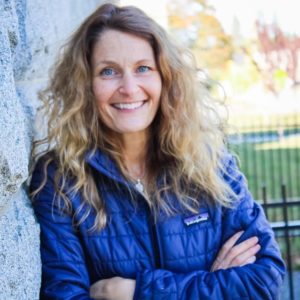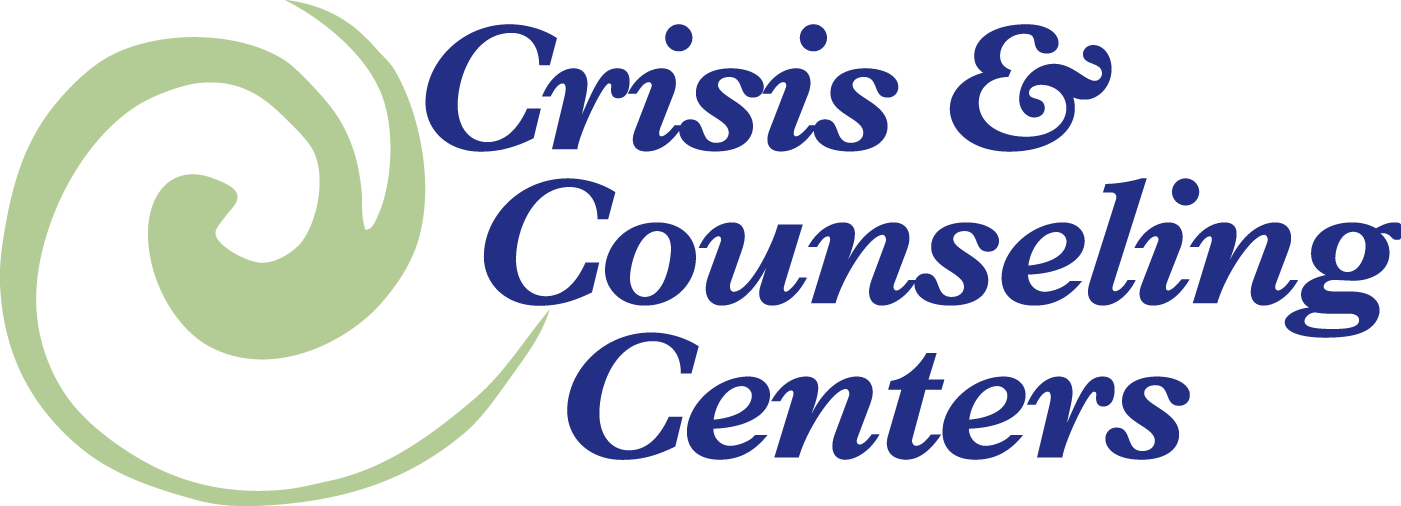
Jennifer Olin (She/Her), LCSW, CADC, MHRT/CSP, MIIM, Co-Occurring and Mental Health Clinician
“I feel like it’s a privilege,” Jennifer Olin says of her work as a co-occurring and mental health clinician at Crisis & Counseling Centers. “People let you into their lives, and you know, most of the time people don’t come to see us because they’re worried they’re going to have too much fun on vacation. They’re carrying some heavy, heavy things that are holding them back in their lives. And they’ve been brave enough to take the step to come forward and to say, ‘I think I need some help with this.’ And so, to be able to build a relationship where someone trusts you enough to let you into the worst parts is just amazing. I think people are so brave to be able to do that. And to be able to walk that path with them is immensely rewarding.”
Jennifer provides mental health therapy at Crisis & Counseling (C&C) and works with clients with co-occurring disorders, e.g., a substance use disorder and one or more other mental health disorders. Jennifer has to battle the perception that mental healthcare is not as important as physical healthcare as a mental healthcare provider.
“If you have a cold, or if you think you have a broken bone, that’s considered to be medically related, and you usually start by going to visit your primary care physician. Oftentimes, you might be sent to a specialist. Let’s say if there is a broken bone, they’ll send you to see an orthopedist. However, when people are referred for mental health care, I think there’s a perception that that’s not considered the same kind of medical care that the other more physical aspects of healthcare symbolize. I think that there’s still some hesitation about working with somebody around mental health or other kinds of issues that, that signifies that maybe you’re not able to deal with your problems on your own or to problem solve.” Jennifer does not see a person’s struggle to cope as a sign of weakness as many people still do, but rather a condition of being human. “The human brain hasn’t evolved to be able to handle some of the content, and some of the things that people are exposed to and the cumulative effects of that can be quite significant over time.”
The overall goal of Jennifer’s work is to help her clients overcome barriers; how that looks can vary widely based on the issues they’re dealing with. “We help people figure out what their barriers or impediments to some measure of healthy normative functioning are. Then, we try to help people find ways to work with the barriers. The ideal approach would be to remove the barriers so that they don’t exist at all. That’s the best-case scenario, but in some cases, we can’t do that. We don’t have complete control, and we can’t remove a barrier or an impediment altogether. So we work together to generate strategies so it is not interfering with a person’s ability to lead a healthy, whole, and meaningful life. We work with many people who have pervasive mental illnesses, so the goal is to help people get to what we would call good enough. We strive for noticeable, significant, measurable, verifiable improvements that make a positive difference in a person’s everyday life.
Jen began her career in International Community Development. She worked with and for communities in Latin America, the Caribbean, and Alaska before realizing that she wanted to expand her skillset and delve into social work. Jen did her clinical internship at C&C and has continued her career with us; she’s now been at the agency for five years.
The mental health program works as a team to ensure that clients are receiving the best care possible. Like a primary care doctor recommending a specialist, Jen and her colleagues try to find the clinician best suited to work with each client and their particular needs. “I think that as practitioners, we have an ethical responsibility to determine if we’re well-versed and qualified enough to work with a particular set of challenges for an individual. So, for example, somebody might present with a set of challenges that I could work on to some extent, but I could see that the length and depth of treatment is probably beyond what I feel my training and expertise would benefit them. One example of that might be a particular kind of eating disorder, that can be a field sometimes that providers specialize in.”
While many of Jennifer’s clients come to her through referrals from C&C’s crisis program, she also gets referrals from primary care providers, case management agencies, the Department of Health and Human Services, and occasionally local law enforcement. In addition, Jennifer also receives referrals from C&C’s substance use disorder program as many clients struggle with co-occurring disorders.
Co-occurring disorders may develop for many different reasons, but using substances as a coping mechanism is common. “When a person is experiencing some level of added stress or distress in their life, whatever the cause of that is, it’s becoming more intrusive and interfering more with their ability to function,” says Jennifer. “And often, when we talk about distress, we’re talking about thoughts and emotions that are unpleasant, unwanted, and that we want to find a way to get rid of. And substance use is one way to do that.
What we always try to help people realize is that there’s no shame in that. You did the best you could with what you had. You found something that helped you at that moment, right? You needed relief from something, and you got it. But, unfortunately, dependency sometimes develops from there that sometimes leads to other types of behaviors that become very problematic, and things start to unravel.”
While quarantine was highly beneficial in preventing the spread of COVID-19, it took a toll on many people’s mental health, leading to unhealthy coping mechanisms like substance use. “One of the things that we know from the pandemic is that people became increasingly isolated, which led to disconnect that goes against the human condition,” says Jennifer. “As a species, we cannot survive in isolation. Our species would die. We have to be connected. And yet, for these other safety reasons, we had to be separated and isolated from one another to a large degree.
To begin with, people who present with higher risk factors might have a more difficult time weathering something like that because they’re already in a more fragile state. And so that isolation can be that next thing that pushes them over. What do we do? We turn to substances; we turn to something to make those bad feelings of loneliness or demoralization or shame or whatever it is go away.”
The pandemic was brutal not just for those struggling with substance use but for clients struggling with all types of mental illness. “All of the symptoms, for the most part, I think for a lot of people have become amplified.” There has been a sense of pride about how well they’ve dealt with such a difficult time for some. “And yet on the other side of that, there are some people who, because of some of the adversities that they’ve gone through in their past, have been very gratified in being able to recognize that they’ve weathered this storm pretty darn well,” says Jennifer. “Because they’ve been through some tough things in their lives before and on the scale of what they’ve been through, this wasn’t actually all that bad. So it’s individual.”
Once Jennifer’s clients adjusted to the new online format that COVID ushered in, some have preferred remote therapy over in-person sessions. However, as the pandemic shifts again, Jennifer has seen a new kind of anxiety. “I’ve even noticed it for myself. The first couple of weeks I came back to the office, I had so much nervous energy because I hadn’t been in a space like this with other people. Transitioning back into the office or seeing people in a group setting and doing social things, it’s exciting, and we want it, but it’s also over-stimulating and overwhelming. So I think we’re seeing some struggles with transitioning back to some modified form of life as we used to know it.”
Despite how hard the outpatient mental health program works to serve clients, they cannot provide therapy to many who need it. With the program severely understaffed, there aren’t enough clinicians to care for new clients as soon as they seek counseling. As of writing this story, there are 160 clients on the waiting list to receive mental health or co-occurring therapy at C&C. In looking toward the future of the program, in addition to gaining new co-workers, Jennifer hopes to be able to provide mental health therapy more holistically by incorporating practices like trauma-informed yoga or other therapeutic groups. She feels honored to provide her clients the help she is capable of giving right now, though.
“We are the facilitators. Our clients are the people who are doing the work,” says Jennifer. “We have the opportunity to help them create the conditions that are going to allow for the changes that they want and need to make. To be able to be a part of that is just really the best thing ever. Sometimes we don’t always know how much of a difference we’ve made or if we’ve provided that extra little thing, but sometimes we do. Building relationships and trust and being allowed into someone’s life in these most intimate of ways, and the level of intimacy around what they’re sharing is profound.”
About Our Mental Health Services
Our Mental Health services are designed for those struggling with issues they would have a hard time dealing with on their own, whether a mental illness or a distressing experience or situation. Even if you are not sure what exactly you are struggling with, therapy can be hugely beneficial. Therapy provides a safe place to express feelings, clarify thinking, problem-solve difficult life decisions and move toward goals. We offer brief solution-based treatment or more long-term support. Our mental health clinicians have experience providing child and family therapy and working with individuals with substance use disorders, grief and loss, co-occurring disorders, depression and anxiety disorders, and many other disorders. To schedule an appointment with one of our caring and experienced clinicians, please call Central Services at 207-626-3448 or request services online.
